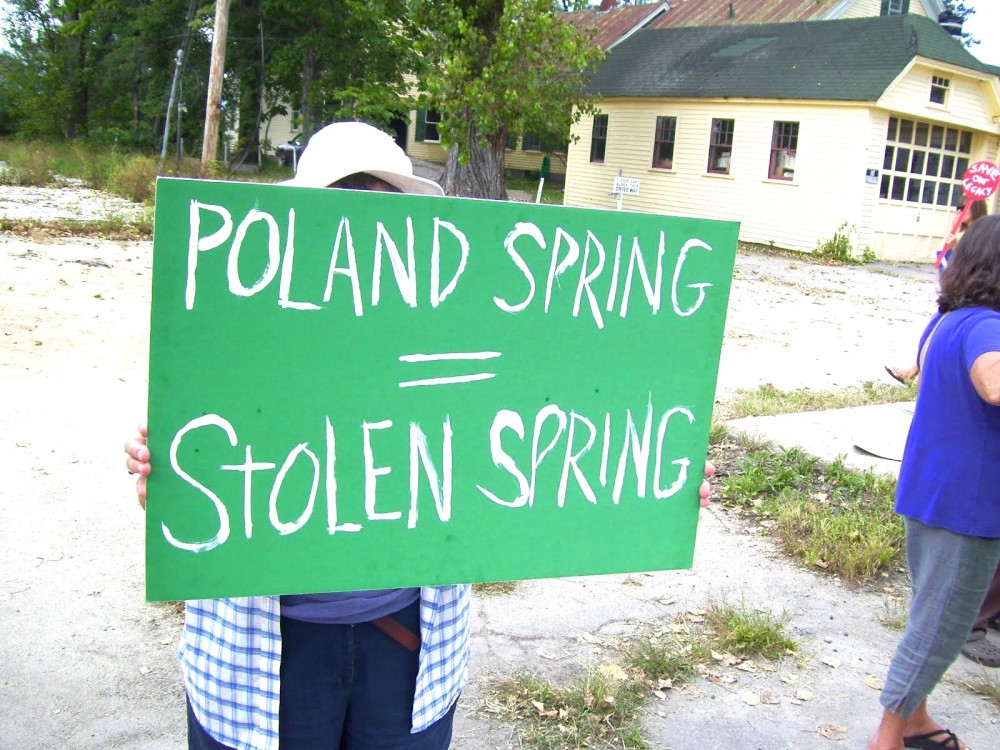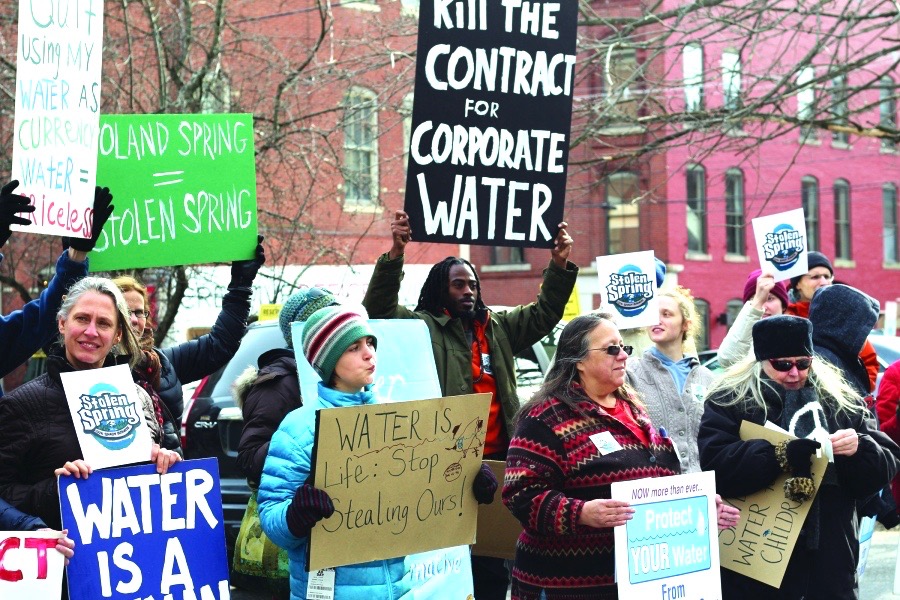
A struggle that lasted more than a decade in the small town of Fryeburg, Maine, ended on May 13 when the state’s highest court allowed a deal for Fryeburg Water Co. to sell 75 million gallons of water a year to the bottled water company Poland Springs. Founded in 1845, Poland Springs had itself been sold to the world’s largest food and beverage company, Nestlé, a Swiss corporation, in 1992. Nestlé has a long history of buying up public supplies of freshwater throughout the world and re-selling it at a mark-up in polluting plastic bottles.
According to Peter Gleick, author of “Bottled and Sold: The Story Behind our Obsession with Bottled Water,” only a third of a bottle of Poland Springs water actually comes from the famous spring. As Gleick explained to Mother Jones reporter Kate Sheppard, “They don’t like to advertise that fact, and there’s no legal requirement that they say on their label where the water comes from.”
In researching his book, Gleick “found that only about 55 percent of bottled waters are actual spring water.” The remaining 45%, including those produced by Coca-Cola and Pepsico under the name brands Aquafina and Dasani, respectively, “are from municipal sources.” This means that of the 11 billion bottles of water Americans buy on average every year, almost half contain tap water much like the kind we drink at home.
The System Says it's Legal
Nestlé’s plan in Maine was to drill a new well in the nearby town of Denmark, and “pipe water to a water-loading station in a Fryeburg residential area.” After initially granting drilling rights to the company, town planners reversed their decision due in part to the activism of a group called Western Maine Residents for Rural Living, which formed to protest the water grab. Among various reasons given for stopping the project, planners said the company’s activities could have negative impacts on the community, producing noise and other pollution in the town.
Not satisfied with the planners' decision, Nestlé took the fight to the courts. The company probably did this in the hopes of setting a precedent as much as achieving any short term goals. Nestlé made it clear from the start that it would use its financial resources to bankrupt the town if necessary. The company lost and appealed four times until the recent ruling. Its longstanding argument that the right to grow its business trumped Fryeberg’s right to control its water resources didn’t sway any but the most right-wing, pro-business judges.
The big setback for the people of Fryeberg came in October when the decision was taken out of local hands and the Maine Public Utilities Commission approved the long-term, 25-year contract, which could be extended up to 45 years. The process leading to the eventual approval was unusual to say the least, as “all three of the PUC’s commissioners recused themselves from the case over conflicts of interest, as they each had business involvement with Nestlé Waters prior to their appointment to the commission.”
Three temporary commissioners were then appointed by Republican Gov. Paul LePage (an early Donald Trump supporter), who quickly approved the company’s bid to take the town’s water. This decision was the one recently upheld by Maine’s Supreme Judicial Court. In fairness to the court, the rigged system put into play by the PUC left the judges little choice in the matter.
However, this decision could lead to other such long-term leases throughout the state, and elsewhere, as Nickie Sekera, an organizer with Community Water Justice and a trustee of the Fryeburg Water District, said after the decision: “It is not within the PUC’s purview to consider long term environmental impacts of water mining on Maine’s aquifers, and because 'the precautionary principle’ is not considered, any burden of proof would befall on local citizens, which puts all of Maine at risk from over-extraction.”
Of course, Fryeberg isn’t the only town facing voracious water companies like Nestlé looking to plunder their supply. On the other side of the country, in Hood River County, Oregon, Nestlé worked for seven years to gain access to Oxbow Springs, and municipal water in the nearby town of Cascade Locks, where they had also planned to build a $50 million bottling plant. But a ballot measure recently blocked Nestlé’s plans, effectively “banning large water bottling operations in the county” of Hood River, signaling that the people had won their fight against Nestlé. In a county with high unemployment, citizens knew that by stopping the company they would be sacrificing a number of good jobs, but overwhelmingly voted to protect the commons. There is also the likelihood that Nestle will take the issue to the courts, so a final victory is anything but assured.
As far away as Pakistan, Nestlé is also working to privatize water sources. In the community of Bhati Dilwan, a deep well Nestlé built for its Pure Life brand has left locals without access to clean water. This is of little concern, however, to Nestlé chairman Peter Brabeck-Letmathe, who is now famously on the record for saying, “Access to water is not a public right.” Tell that to the citizens of Fryeberg, and so many others around the world, whose only hope is to stop Nestle and other water companies from taking their water before it is too late.
3 WAYS TO SHOW YOUR SUPPORT
- Log in to post comments













